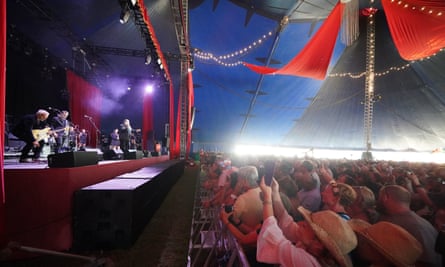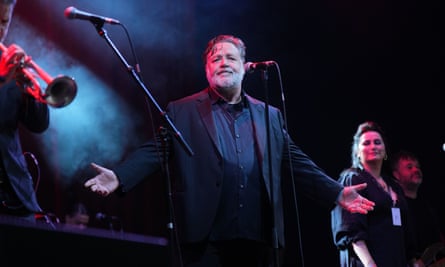Glastonbury’s cinema tent has hosted an impressive range of A-listers this year, from Paul Mescal (whose short shorts are yet to influence the Glasto blokes who adore a practical cargo pocket) to Tilda Swinton, Florence Pugh, Simon Pegg and Cate Blanchett. All dilettantes at this music festival, though, compared with actually singing Russell Crowe at the field’s opposite tent, the Acoustic stage.
In his Oscar-nominated performance in Gladiator he was “father to a murdered son, husband to a murdered wife”, and I rather thought he’d be uncle to a series of murdered cover versions, but I’m proved wrong. Billed as his Indoor Garden Party and backed by a sizeable band, he sings a series of self-penned songs inspired by moments in his own life, from thwarted love to the death of his father.
If you’re wondering what Russell Crowe’s music sounds like, yes, it’s that. He lives up to his everybloke image with music that isn’t just middle of the road but actually paints the white lines down it: a bit blues-rock, a bit country-rock, a bit rock’n’roll, a bit AOR, a bit singer-songwriter. His capable, unremarkable band cover all the bar-band bases: rhythmic piano, workmanlike trumpet, backing singers in minidresses sashaying and fingerclicking. Chords resolve with all the dull predictably and solidity of a straight-to-streaming three act drama. You rather imagine if Crowe transposed his lyrics into film dialogue, he’d wrinkle his nose at the script’s cliches and aphorisms: “Time keeps rolling on to the happy ever after”, “water is stronger than stone”, “how do I take this losing hand and somehow win”. A number of tracks are from a new album with the quite operatically Alan Partridgean title of Prose and Cons. There’s also flash of danger early on when his mic has a touch of static and he gives a glance sideways of pure intimidation. A new one is duly provided within about four seconds.

But thereafter he’s a big teddy bear and this set is really winning, not least because Crowe has a magnificently robust voice. It’s famously deep, and this maximalist band doesn’t always suit it, swamping it with their booming mid-range at times. But that voice has character, grain and layers, and pairs really well with a pared back piano ballad; he and his band could give Coldplay later on a run for their money with a cache of whoa-oh-oh choruses.
And as you’d expect, he’s absolutely amazing at telling stories, his between song patter somewhere between best man speech and sermon. The song Southampton is amusingly about Crowe being jilted by a woman who chose to go to Southampton alone instead of Paris with him. “The fuck you talking about? Southampton? If you had to list the top 5,000 places in the world to see before you die, guess what’s not in the list.” He leaves a microbeat of distilled comic timing. “Fucking Southampton.”

He tells a story about he and his grieving mother being invited to see the Sistine Chapel with no tourists, even getting to see it fully illuminated as the pope does. Why, he asks the chapel’s custodian. “You are the eighth king of Rome”. Told in his Aussie accent, it’s not A-lister bragging but a lovely tale of an ordinary bloke swept up into an extraordinary plane of life. Another number is introduced with a story of the room in his house where he keeps all his “sparkly shit”, ie award statues. “A lot of people in my industry would spread that shit right through the house …” he says slyly, before saying that a prized possession on the wall is a letter from Johnny Cash, who wrote that he went to see one of Crowe’s films three times in one weekend. It inspired a “country-swing” songwriting sesh with Crowe chatting with the ghostly Cash: “Is this yours mate? Am I writing this for you?” The subsequent song is Cash cosplay, but endearingly so, with Crowe nailing the droll, dry way Cash’s vocal melodies meander up and down.
These are A-grade anecdotes – glam, gossipy but self-effacing, and so casually told. He has that unreachable reality-bending presence of Hollywood actors, while being remarkably down to earth: a potent combo. Crowe may not be the world’s greatest songwriter, but he’s a very decent singer, and a truly world-class star.
Source: theguardian.com


